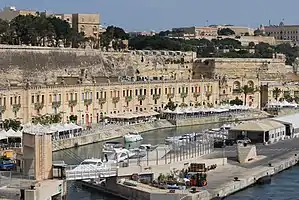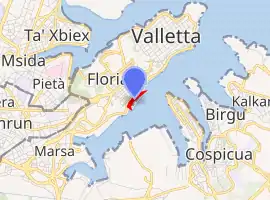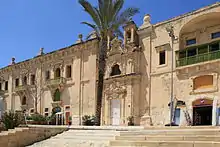Valletta Waterfront
The Valletta Waterfront, is a promenade in Floriana,[1] Malta, mainly featuring three prominent buildings: a church in the middle, the Pinto Stores or the Pinto Wharf on the left, and the Forni Stores or the Forni Shopping Complex on the right. The buildings were originally stores and warehouses, built in the 18th century, and the design is attributed to Andrea Belli.
| Valletta Waterfront | |
|---|---|
Xatt ta' Pinto | |
 The Valletta Waterfront outside Floriana Lines | |

| |
| Former names | Valletta Marina |
| General information | |
| Status | Partially intact |
| Type | Wharf, stores |
| Architectural style | Baroque |
| Location | Floriana, Malta |
| Opened | 10 August 1752 2006 |
| Owner | Government of Malta and private property |
| Technical details | |
| Material | Limestone |
| Floor count | 3 |
| Design and construction | |
| Architect | Andrea Belli (attributed) |
The building project was officiated on 10 August 1752, with a mass festivity. The Forni Stores were used as the first British naval bakeries in Malta and were used for this function until 1844.[2] The area is now a hub in Malta's cruise liner business as the Forni Cruise Passenger Terminal, and hosts a concentration of bars, retail outlets, and restaurants. The area was and remains a venue for several concerts and events.[3]
History
The Valletta Marina was first developed in July 1727 by Grand Master Anton Manuel de Vilhena when, according to a notarial deed of Gaspard Dominic Chircop, "a store-house with marble oil-vats" was built.[4]
Further stores and warehouse were added in 1752, that included 19 imposing stores and a church, built by Grandmaster Manuel Pinto de Fonseca.[5] The buildings, including the stores and the church, have a Baroque design attributed to Andrea Belli.[6]
_01_ies.jpg.webp)
The area was devastated by aerial bombardment in World War II, due to its proximity to the Malta Dockyard and the British naval forces in Grand Harbour. Some of the stores were completely destroyed during the war.[7]
The area was thoroughly restored and renovated. Some buildings, which had been completely or partially destroyed in the WWII, saw their facades rebuilt at the exclusion of the interior.[8] The area behind these rebuilt facades is now a car park. The doors of the buildings are painted with different colours, symbolising the different types of goods that were once stored in them; blue represents the storage of fish, green for agricultural products, yellow for wheat and red for wine.[9]
The Valletta Waterfront is run by a private consortium who offers management overseeing Malta's cruise liner business. The waterfront hosts roughly twelve restaurants, a number of bars and retail outlets. Various events are held at the area and the close vicinity,[10] such as the Malta Jazz Festival and the Malta Fireworks Festival.[11]
The Church of the Flight into Egypt was built in 1752, along with the stores, was bombed in the Second World War and the damaged parts have since been faithfully rebuilt similar to the original and the original remains were restored. Mass is celebrated at the church every Saturday evening.[12] A bronze image of the face of Jesus was attached to the church and is now found with the façade of the Co-Cathedral of Saint John in Valletta.[4]
The Pinto Stores were included on the Antiquities List of 1925,[13] are a grade 1 national monument[14] and they are listed on the National Inventory of the Cultural Property of the Maltese Islands (NICPMI).[15]
Further reading
- Guillaumier, Alfie (2005). Bliet u Rħula Maltin. 2. Klabb Kotba Maltin. p. 947. ISBN 99932-39-41-0.
References
- Bonnici, Joseph; Cassar, Michael (2004). A Chronicle of Twentieth Century Malta. Books Distributors Limited. p. 296. ISBN 978-999097227-6.
- Prepared by the Planning Authority (July 1998). "Valletta Cruise Terminal Development Brief". Commissioned by the "Valletta Cruise Terminal Steering Committee". p. 16.
- Serracino, Joseph (30 June 2018). "Dawra kulturali mal-Port il-Kbir (27)" (PDF). L-Orrizont. p. 12. Retrieved 14 June 2020.
- Borg, Joseph (1974). "The Custom House - Malta" (PDF). Scientia. 2 (2): 59–80. Archived from the original (PDF) on 7 May 2019.
- Buhagiar, Mario (2009). Essays on the Knights and Art and Architecture in Malta, 1500-1798. Malta: Midsea Books. p. 210. ISBN 978-9993272465.
- Thake, Conrad (16 May 2008). "The Architectural legacy of Grand Master Pinto (2)". The Malta Independent. Archived from the original on 1 August 2016.
- Psaila, Christian (8 December 2005). "The Floriana Waterfront". Times of Malta. Retrieved 15 November 2014.
- Spiteri Staines, Joanna (20 February 2011). "From Blood Rock to Barriera Wharf". Times of Malta. Archived from the original on 3 July 2016.
- "Pinto Stores" (PDF). National Inventory of the Cultural Property of the Maltese Islands. 28 December 2012. Retrieved 17 October 2015.
- "Spend some quality time". Times of Malta. 7 November 2014. Archived from the original on 5 October 2016.
- "12 Top-Rated Tourist Attractions in Valletta - PlanetWare".
- Scerri, John. "Floriana". malta-canada.com. Archived from the original on 6 August 2016.
- "Protection of Antiquities Regulations 21st November, 1932 Government Notice 402 of 1932, as Amended by Government Notices 127 of 1935 and 338 of 1939". Malta Environment and Planning Authority. Archived from the original on 20 April 2016.
- "Att ta" l-1992 Dwar l-Ippjanar ta' l-Izvilupp (Artikolu 46)" (PDF). The Malta Government Gazette. Department of Information (273): 5333. 28 March 2008. Archived from the original (PDF) on 22 March 2017.
- Anon (30 December 2012). "125 properties on National Inventory of the Cultural Property". The Malta Independent. Retrieved 10 March 2016.

